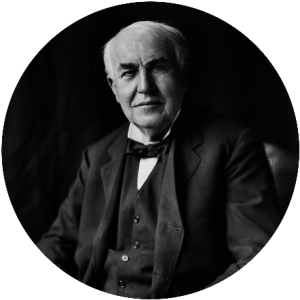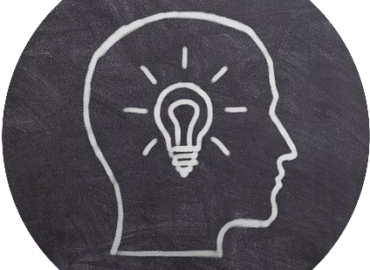Thomas Edison’s Take on Sleep
For those of you who don’t know who Thomas Edison is here’s a quick overview. Thomas Alva Edison was born in 1847 and died in 1931. He is considered one of the world’s most prolific inventors, inventing a vast array of items in various different categories including mining, electricity distribution, lighting, motion picture cameras, and sound recording to name but a few. He is perhaps most widely known for inventing the electric light bulb which has literally brightened the lives of many people since its implementation many years ago. He is best known for his persistence and stoicism in his attempt to perfect the Light Bulbs design after numerous failed attempts.
He is often quoted as saying “I have not failed I have just found 10,000 ways that won’t work” although there is often debate about the actual figure and depending on where you read it can be 1,000 5,000 or 10,000. Either way to try and fail and try again on this scale takes resolve, determination and persistence and is testament to anyone who persists with their dreams and ambitions until they are realized!
Edison had over 1000 patents to his name which in itself is a remarkable achievement. It goes without saying that he valued his time and every waking hour was put to use.
Sleep just happens to be one of those things in this world that no one can ever live without. Not getting enough good quality sleep can lead to more problems than you could ever imagine, both mentally and physically check out how much sleep is recommended based on your age here.
Have you ever wondered what geniuses like Edison thought about sleep? Did he have a special sleeping habit or pattern that enabled him come up with his genius inventions and change the world for the better?
You can read more about Edison’s life and achievements here.
The Power Nap of Geniuses
Many of the recognized geniuses throughout history of which Edison is one, believe that in order to stay ahead of the curve they must manage their sleep in much the same way as they manage their daily life. Their sole focus and drive is to achieve a certain task or goal. This is why they often happen to reduce or streamline their sleep in order for them to have more functional and productive waking hours.
Thomas Edison and Nicola Tesla were popular advocates of the principle of the power nap. The Power Nap is the concept based on the idea that you can get a good nap for 20 minutes which will help to reset and recharge your brain enabling the person to get back into their working mode faster. It can temporarily fight off fatigue which enables people to work for a longer time, yet still remain efficient.
Regarded as one of the world’s greatest politicians, Winston Churchill was also a little left of field as far as his bedtime habits were concerned. Did you know that he kept his own bed in the House of Parliament since he considered his naps to be a crucial aspect of successful governance? Every day at 5 in the afternoon, he sipped soda and weak whiskey and took a nap for 2 hours. This was his popular siesta that allowed him to get half a day’s sleep worth for every 24 hours that passed. It is why he had a very odd schedule to the point that he had been known to have held war cabinet meetings while taking a bath.
What is Sleep for Thomas Edison?
Best renowned for inventing the light bulb, there is no doubt that Edison is among the most famous names responsible for bringing light to all homes around the world.
But, Thomas Edison’s take on sleep was that it was a mere waste of time, and was a habitual trait passed on from the human race’s cave days. Would you believe that he would do anything possible just to reduce the amount time he spent asleep? He also curiously followed the Polyphasic Sleep Cycle, the same cycle Leonardo Da Vinci used. It is a nap-oriented pattern meant to free up as much waking time as possible.
If you study him further you will realize that it took him superhuman biological feats to fuel his remarkably ambitious to-do list. Reports claimed that he slept for only 3 to 4 hours every night. Edison is also usually accused of forever disrupting the internal clocks of mankind when he invented the light bulb. (Haters Gonna Hate! Right?)
There are even some researchers who have estimated that his artificial light bulb invention has taken away 1 to 2 hours of sleep every night from modern society. Thanks to Edison’s invention, sunset is no longer the end of social life but instead, it marks the start of it regardless of time zone or season. Darkness no longer has the upper hand when the sun goes down around the world. The artificial light being used prior to Edison’s light bulb (usually candle light and flaming torches) could be considered the equivalent of a match’s brightness versus the Blinding lights of time square.
Edison had a lot of faith in his invention’s ability to free people from the burdens of sleep. He even made several boldly eccentric causal inferences. When he went to Switzerland riding in a motor car to visit little villages and towns, he took note of how the artificial light affected the inhabitants. Where electric light and water power were developed, everyone seemed intelligent. In places where appliances didn’t exist, and people go to bed with their chickens and stay there until the break of dawn, there were relatively less intelligent he surmised.
In 1921, he also wrote that people won’t do what they just like to do because they overdo this 100%. Many people oversleep and overeat 100% since they like it. This additional 100% makes them inefficient and unhealthy. The person who gets to sleep 8 or 10 hours every night is never completely awake and never completely asleep, they just had different degrees of doze through the 24 hours. For himself, he never found a need for over 4 or 5 hours sleep in those 24 hours. He never dreamed. This is real sleep. He found that if he ever got to sleep more, he woke up indolent and dull.
He added that there were always people talking and discussing how loss of sleep was becoming a calamity. For him, it should be called loss of time, opportunities, and vitality. Just to satisfy his curiosity, he even went through British Medical Journal’s files and couldn’t find even a single case that reported of a person who got hurt because of loss of sleep. The case of insomnia is another issue but there are people who assume they already have insomnia if they only get to sleep 10 hours per night.
Of course, Thomas Edison’s take on sleep were not just scientifically misguided but more hypocritical. Everyone knows that sleep is vital to overcome creative blocks, and Edison also thought and felt the same way. While he brandished his lack of sleep like a badge of honor, he had this duplicitous tiny secret, none other than power napping. Aside from the napping cots scattered all over his property, from libraries to labs, he was frequently photographed getting his stealthy shut eye in the most unusual places.
He used napping for counterbalancing his work’s intensity. Most of the time, he took one or two short naps, on his popular cots, outside in the grass, as well as on a stool or chair if there were no better options available. Based on several first-hand accounts, Edison always awoke from these naps reinvigorated instead of groggy, prepared to face the day with zest and full alertness.
Indeed, Thomas Edison’s take on sleep is verging on incredulous. While not many people might like his principle, at the end of the day, this was probably his secret for the development of his inventions, and perhaps there is something to be said for the use and implementation of power naps into a daily routine if sleep at night is a little more difficult to come by.
We’d love to hear your thoughts and feelings about sleep and what works best for you. Perhaps you have discovered something new today that may help you going forward, if so brilliant please feel free to leave a comment below and like and share too, if you liked reading our blog post.




